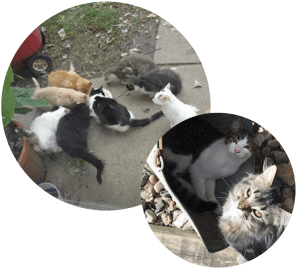
Feral, stray or abandoned cats will gravitate to areas where there is food and shelter. When these cats are left to fend for themselves, they create all manner of issues for the community: risk of disease, babies, fighting, babies, spraying, babies, mating, and more babies, The proven method of TNR works to see that the cats are fixed and vaccinated.
Spayed/neutered cats stop most of the fighting, spraying, yowling and other related mating issues and the vaccinations stop the risk of rabies. Once the cats have received their “spa treatment” (spay, neuter, vaccination), being returned to their home maintains the colony, which will now not multiply and not present risk to the community or offer nuisance behavior.
The fixed cats will remain territorial which will prevent most newcomers from joining the established colony. The final result is a colony that will reduce in numbers and eventually die out.
If you have been providing food and water on a regular basis this is something you will want to continue. You have most likely already figured out cats are very routine and they will be waiting for you to arrive to fill those dishes.
Hopefully the area where you feed the cats provides some shelter or protection for the cats. Most likely it does, or the cats would not gather there. If needed, create some feeding stations for the cats that will keep the food and water clean and dry. You can find many ideas on the web, just by doing a search on ” feral cat feeding stations”.
If they are feral or so frightened that you cannot pick them up to place into a carrier, you will either need to find a TNR group in your area or purchase live traps in which to trap the cats yourself. NOT fixing the animals is not an option. You will be adding to the nuisance and risks involved with outdoor cats if they are not fixed. Feeding unfixed cats is NOT a managed colony. Be sure to fix both male and female cats. Males are the worst for spraying and fighting and spreading FIV and causing wounds. Male cats can routinely travel 10 miles a day, with female colonies all along the way.
If there is not a TNR group in your area, search for a low cost spay and neuter clinic in your area and follow their protocol for bringing in feral cats. The cost to fix and vaccinate all the cats may have to come out of your own pocket, unless you can find others that will help you foot that bill. A local TNR group may be able to help with the trapping and or the finances of this part of your project.
If you have never trapped feral cats before, there is definitely an art to it and you should read up on the process. Alley Cat Allies is a great place to find instructions. This is where Whiskers learned and we highly recommend you visiting their site.
Once the cats are all fixed, you should be sure to continue the food and water routine. You will also notice a dramatic difference in the cats. They should be much healthier looking and calmer. The fighting and mating issues should nearly disappear. Some of the male cats may leave due to the fact that there will be no fertile females. The good part is that no matter where he ends up, he will not be able to create litters of unwanted kittens.
Keep your eyes peeled for newcomers. Hopefully the colony will be so territorial, they won’t allow newcomers, but you may see one. If so, it is very important to trap that one and get it in. Not getting newcomers in for spa treatment will cause your colony to grow and bring nuisance issues back…
Another important reason to monitor is to be sure the cats stay healthy. If you notice one is injured or sick, it may be necessary to re-trap to get it in for vet care.
Overseeing a Community Cat Colony can be very inspiring and fulfilling. We wish you all the best as you care for these who otherwise may have no one.